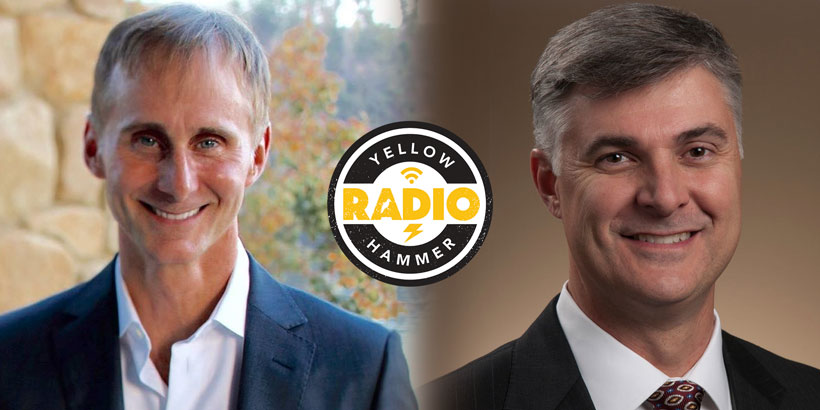Birmingham, Alabama-based financial guru Jeff Roberts, who was recently named one of the top private wealth advisors in the nation by Barron’s®, came on Yellowhammer Radio Tuesday to lay out the facts so people can decide for themselves.
The full conversation with Mr. Roberts can be heard on the Yellowhammer Radio podcast or in the video above, and a lightly edited transcript of his interview with Yellowhammer’s Cliff Sims can be read below.
Subscribe to the Yellowhammer Radio Podcast on iTunes. Learn more about Jeff Roberts’ private wealth advisory practice at JeffRobertsAndAssociates.com.
Scott:
What are we talking about today Jeff?
Jeff:
Well, it’s kind of hard to believe that we’re already in November so the year end brings some financial planning considerations and today I thought I might touch on three considerations that I categorize under the heading of “tax harvesting”.
Scott:
What the heck is “tax harvesting”?
Jeff:
In my practice it involves three strategies. So we’ll probably have time to cover one today. First is understanding the impact of capital gains distributions of mutual funds held outside of your IRAs and 401k plans. So taxable mutual funds and capital gains distribution that’s kind of one part of tax harvesting. Two is paying attention to embedded capital gains or losses of each investment held in a portfolio, again outside your IRA. And if you find gains or losses discussing strategies to purposefully sell some holdings that are up and some holdings that are down and the goal would be for gains to offset losses. Essentially neutralizing the taxable gains in an attempt to minimize taxes. Number three of tax harvesting commonly involves people in retirement where they’re able to control their taxable income and therefore control their tax bracket. This is where we intentionally withdraw taxable income from an IRA, 401k plan in order to completely fill a 10% and 15% tax bracket. Using this strategy we are intentionally harvesting taxable income to make sure that a client pays as much taxes as they can in the 10% of 15% tax bracket.
Scott:
That is a lot. So why don’t we just do the first one, Jeff. Can you explain capital gains, distributions and mutual funds?
Jeff:
To get an understanding of that I’ll start with just a quick review of how a mutual fund works and what it is. I know we’ve got a wide range of experience in the audience but I’ll just start us at the basic level. If you assume that a mutual fund is basically a investment platform where there’s a manager whose job is to invest in investment securities. Could be bonds, could be stocks, all under one basket where they agree to diversify the portfolio in at least twenty holdings and they will manage that investment portfolio under an agreed preset investment risk profile, investment objective. so each mutual fund has it’s own investment platform with what they’re going to do and how they’re going to invest it and there’s thousands of mutual funds out there. Each manager’s job is to make sure that their investment portfolio aligns with the mission of that fund and to get the best performance they can. So they’re shareholders in a diversified portfolio of stocks or bonds or a combination for example. Now, that’s the concept of what a mutual fund is. It’s where you have a manager that’s managing the portfolio for you so you don’t have to pick and choose the different investments.
Scott:
So how does the capital gain part come into play?
Jeff:
Okay, this is the interesting part. So we’ll make up a fund name called “ABC Fund”. So if you own “ABC Fund” and let’s assume that fund manager’s objective is to invest in large companies, big blue chip stocks. So he has anywhere from twenty stocks to three hundred stocks, 400 hundred stocks, whatever inside that portfolio. If he held a particular company for a long period of time that he’s owned inside that fund and in this year he decides, ‘You know? I don’t want that stock inside the portfolio anymore’ and he sells it. If the stock that he owns, say for four or five or ten years, happens to have appreciated and done really well he has capital gain of that stock when he sells it. And in that year he has to pass that capital gain tax onto the shareholders of that fund. So when you’re buying a mutual fund as the investor, you’re buying into potential capital gains of the securities that manager has held in the fund potentially for a while. And I’ll give you another example of why this could be an issue. Let’s say for example earlier this year you bought “ABC Mutual Fund” and you put your money in it and let’s say that fund went down in value so your principal investment is not worth what it was and then that manager throughout the year happened to have sold some stocks in the portfolio that triggered some capital gains or because the performance is down in the account people have started selling out of it. Getting out and taking their money away which has caused him to sell off internal investments, potentially triggering some capital gains that means that investors that hold that fund may have to pay a capital gain on that fund when it’s a fund that they’ve lost money on. So you’re literally owning a fund that you’ve seen go down in value yet you have to pay a capital gain on it. That’s what harvesting capital gains and losses can be a bout when it comes to mutual funds. In this particular case, is our team wanting to look and see if our clients hold funds that are going to distribute a large capital gain that we might want to avoid by getting out of that fund before the declaration of that capital gain at the end of the year. Confusing I know, I hope that makes sense.
Scott:
No, it does make a little sense. It’s something I had never really thought of. That would be my luck. So basically if you’re holding a mutual fund outside of a retirement plan you could be holding a tax time bomb that you don’t even know if it’s going to happen.
Jeff:
Potentially, yes. Most of the time there’s not a large tax issue to address with the average mutual fund and that’s on an annual basis. But investors need to be watching because sometimes that “average mutual fund” can kick off some hefty taxes or gains I should say. And so most investors don’t even have this on their radar screen quite frankly. Of worse, they’re paying an advisor to work with them who is asleep at the wheel and doesn’t have that even on their radar screen.
Scott:
Good grief. Well Jeff, if someone wants to know more about this thing what should they do?
Jeff:
Call us. These are important tax planning considerations and an essential part of financial planning. They’re also often missed. So let me be clear, when it comes to legal issues we make sure to involve our clients with attorneys. When it comes to tax related issues we recommend clients consult their CPA in all cases. Our financial planning relationship with our clients helps us uncover some of these important things that clients need to be addressing with their team of professionals like their advisor, their CPA, their lawyers. Unfortunately we see many new people come into our offices where these tax planning strategies have just been unattended to. So if you’re thinking, ‘Hey, I’ve got money outside of an IRA in a mutual fund. I have no idea if these things are going to be kicking off capital gain distributions or not,” look us up. We would be delighted to help and coach.











